Learn To Live a Simpler Life and Be More With Less
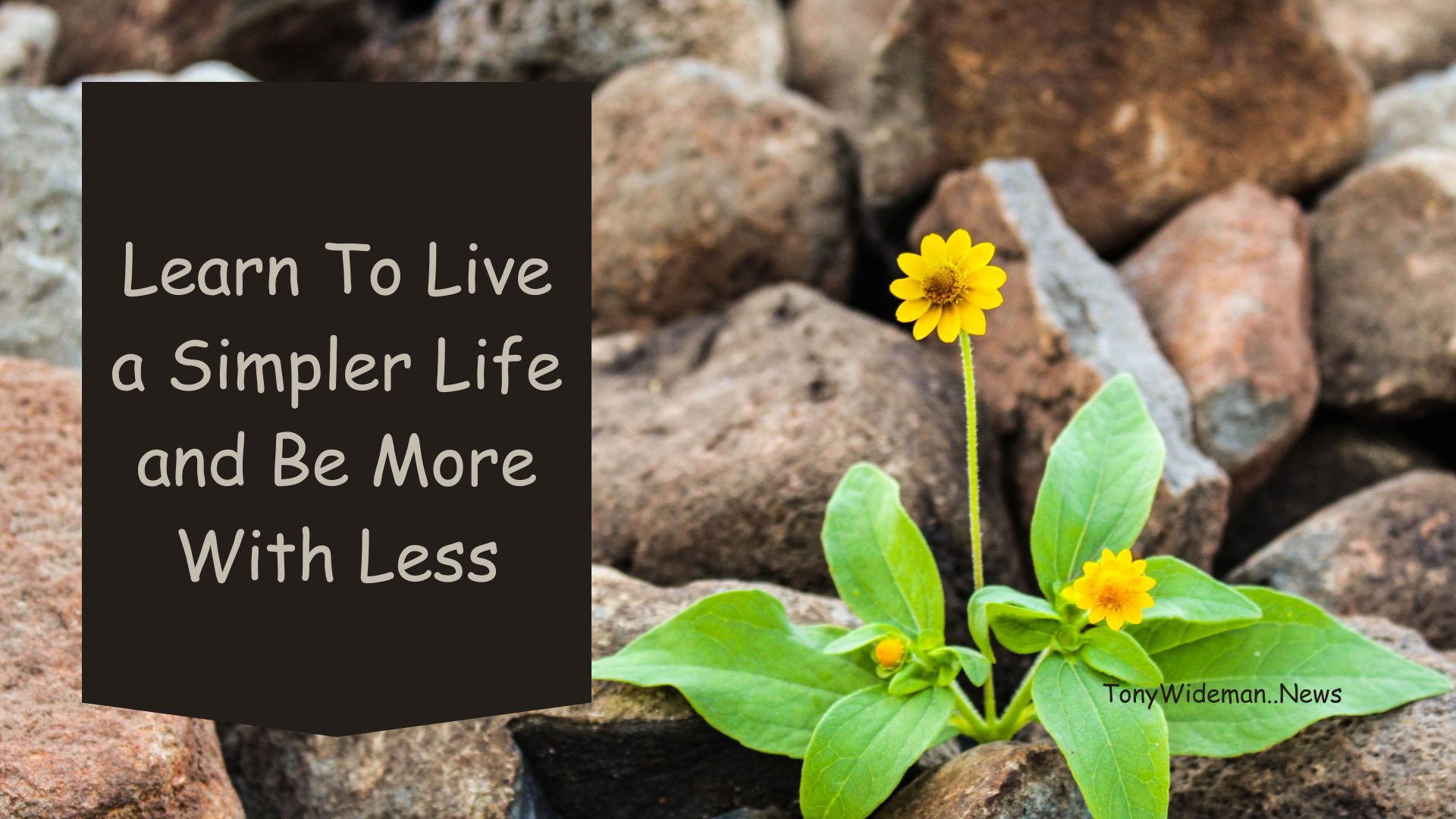
Learn to live a simpler life and be more with less. Living a simpler life and embracing minimalism has become a popular lifestyle choice for many individuals seeking a more meaningful and fulfilling existence.
In a world characterized by constant busyness, materialism, and overwhelming choices, simplifying our lives can provide us with numerous benefits, both mentally and physically.
This post will explore the concept of living a simpler life, provide practical tips to achieve it, and highlight the positive impact it can have on our overall well-being.
Introduction
In our modern society, we are constantly bombarded with stimuli and obligations that can lead to stress, anxiety, and a sense of overwhelm.
Living a simpler life offers an alternative approach, allowing us to focus on what truly matters and find contentment in the present moment.
By prioritizing experiences over possessions and decluttering both our physical and digital environments, we can create space for more meaningful connections, personal growth, and overall well-being.
Understanding the Simpler Life Philosophy
What is minimalism?
Minimalism is a lifestyle philosophy centered around the idea of intentionally living with less. It involves decluttering and simplifying our physical spaces, possessions, and daily routines to reduce distractions and cultivate a sense of calm.
Minimalism encourages us to let go of excessive material possessions and focus on what adds value and meaning to our lives.
The benefits of living with less
Embracing a simpler life can have numerous benefits. By letting go of unnecessary belongings, we can free up physical and mental space, reduce stress, and increase our overall happiness.
Living with less can also lead to financial savings, improved focus and productivity, enhanced creativity, and greater environmental consciousness.
Overcoming societal pressures
Society often promotes the idea that happiness and success are directly linked to material possessions and achievements.
However, by questioning these societal norms and embracing a simpler life, we can break free from the cycle of consumption and find fulfillment on our own terms.
Overcoming societal pressures is a crucial step in living authentically and aligning our actions with our values.
Simplifying Your Physical Environment
Decluttering your home
One of the first steps in living a simpler life is decluttering your living space. Start by assessing each item and ask yourself if it brings you joy or serves a practical purpose.
Letting go of sentimental attachments and unused items can be challenging, but it allows for a more organized and peaceful home environment.
Organizing and optimizing space
After decluttering, organize your remaining belongings in a way that maximizes space and functionality. Utilize storage solutions, such as bins and baskets, to keep items neatly arranged.
Adopting a minimalist approach to home decor can also create a visually appealing and serene atmosphere.
Adopting a minimalist wardrobe
Simplifying your wardrobe can significantly reduce decision fatigue and make getting dressed a breeze. Keep only the clothes that you love and wear regularly, donating or selling the rest.
Focus on versatile pieces that can be mixed and matched, allowing for a more streamlined and sustainable approach to fashion.
Simplifying Your Digital Life
Reducing screen time
In today’s digital age, excessive screen time can lead to feelings of overwhelm and distraction. Set boundaries by scheduling regular tech-free breaks, establishing device-free zones in your home, and being mindful of the time spent on social media.
Disconnecting from technology can create space for reflection, creativity, and real-life interactions.
Organizing digital files and emails
Digital clutter can be just as overwhelming as physical clutter. Take the time to organize your digital files, delete unnecessary documents, and create a logical folder structure.
Similarly, declutter your email inbox by unsubscribing from unwanted newsletters and setting up filters to automatically sort incoming messages.
Streamlining digital subscriptions
Evaluate your digital subscriptions and consider canceling those that no longer provide value or align with your priorities.
Streaming services, software subscriptions, and online memberships can quickly accumulate, both financially and in terms of digital clutter. Choose subscriptions mindfully and regularly reassess their relevance in your life.
Cultivating Mindful Consumption
Being intentional with purchases
Adopt a mindful approach to consumerism by considering the impact of each purchase on your life, the environment, and society as a whole. Before making a purchase, ask yourself if the item is truly necessary and aligns with your values.
Focus on quality over quantity, choosing items that are durable, ethically produced, and support sustainable practices.
Prioritizing experiences over possessions
Rather than accumulating material possessions, prioritize experiences and memories. Invest in activities that bring you joy, such as traveling, spending time with loved ones, or pursuing hobbies.
Experiences have a lasting impact on our well-being and create cherished memories that cannot be replicated by material objects.
Developing conscious spending habits
Track your expenses and identify areas where you can make conscious choices to save money and reduce waste. Opt for reusable products, consider second-hand options, and explore DIY alternatives.
By being mindful of your spending habits, you can align your financial choices with your values and contribute to a more sustainable future.
Nurturing Health and Well-being
Prioritizing self-care
Self-care is essential for maintaining balance and overall well-being. Make time for activities that recharge and rejuvenate you, such as practicing mindfulness, engaging in physical exercise, or indulging in hobbies.
Prioritizing self-care allows you to show up fully in other areas of your life and promotes a sense of inner peace.
Establishing healthy boundaries
In a fast-paced world, it’s crucial to establish boundaries to protect your time, energy, and emotional well-being. Learn to say no to commitments that don’t align with your priorities and limit your exposure to negative influences.
Setting boundaries empowers you to create a life that is centered around your values and goals.
Embracing mindfulness and meditation
Incorporate mindfulness and meditation practices into your daily routine. These practices help cultivate present-moment awareness, reduce stress, and promote mental clarity.
Find a mindfulness technique that resonates with you, whether it’s mindful breathing, guided meditation, or walking in nature.
Building Meaningful Relationships
Fostering genuine connections
Invest time and energy into cultivating meaningful relationships with family, friends, and your community. Prioritize quality over quantity by nurturing deep connections and engaging in meaningful conversations.
Surround yourself with individuals who inspire and support your journey towards a simpler life.
Letting go of toxic relationships
Toxic relationships can drain your energy and hinder personal growth. Identify relationships that no longer serve you and consider setting boundaries or, in some cases, letting go completely.
Surrounding yourself with positive influences creates space for personal development and a more fulfilling life.
Creating space for quality time
In our busy lives, it’s crucial to create dedicated time for loved ones. Plan activities that foster connection and allow for genuine interactions, such as shared meals, nature walks, or game nights.
By prioritizing quality time, you strengthen relationships and create lasting memories.
Embracing Simplicity in Daily Routines
Simplifying meal planning and cooking
Streamline your meal planning and cooking routines to save time and reduce stress. Embrace simple and nutritious recipes, meal-prepping, and minimalistic kitchen tools.
Focus on quality ingredients and savor the process of nourishing yourself and your loved ones.
Streamlining work processes
Simplify your work processes by eliminating unnecessary tasks and automating where possible. Prioritize your most important tasks and break them down into manageable steps.
By focusing on essential responsibilities, you can increase productivity and reduce overwhelm.
Incorporating relaxation and leisure time
Incorporate relaxation and leisure time into your daily routine. Engage in activities that bring you joy and help you unwind, such as reading, listening to music, or practicing a hobby.
Taking regular breaks allows you to recharge and maintain a healthy work-life balance.
The Psychological Benefits of Simplicity
Reduced stress and anxiety
Living a simpler life can significantly reduce stress and anxiety levels. By eliminating excess and focusing on what truly matters, you create a calmer and more peaceful environment.
Simplifying your life allows for increased mental clarity and a greater ability to cope with challenges.
Increased focus and clarity
A cluttered environment can lead to a scattered mind. By simplifying your physical and digital spaces, you create a conducive environment for increased focus and productivity.
Clearing away distractions allows you to direct your energy towards activities and goals that align with your values.
Enhanced overall well-being
Living a simpler life ultimately leads to enhanced overall well-being. By letting go of unnecessary possessions, commitments, and distractions, you create space for personal growth, self-reflection, and authentic connections.
The freedom and contentment that come with simplicity contribute to a more meaningful and fulfilling existence.
Conclusion
Living a simpler life and embracing minimalism can be a transformative journey toward a more fulfilling and meaningful existence.
By decluttering our physical and digital environments, cultivating mindful consumption habits, nurturing our health and well-being, building meaningful relationships, and simplifying our daily routines, we can experience reduced stress, increased focus, and enhanced overall well-being.
Embracing simplicity allows us to shift our focus to what truly matters, creating space for personal growth, contentment, and a life filled with purpose.
FAQs
How can I start living a simpler life?
Starting to live a simpler life begins with small steps. Begin by decluttering one area of your home, such as your closet or kitchen. Practice mindfulness in your daily activities and be intentional with your purchases. Gradually incorporate simplicity into different aspects of your life and embrace the positive changes it brings.
Is minimalism suitable for families with children?
Yes, minimalism can be suitable for families with children. It teaches children the value of experiences over possessions and encourages mindful consumption. By involving children in the process of decluttering and simplifying, you can foster a sense of gratitude, organization, and responsibility.
Will living a simpler life make me happier?
Living a simpler life can contribute to increased happiness and well-being. By focusing on what truly matters and reducing distractions, you create space for meaningful experiences, authentic connections, and personal growth. However, happiness is subjective, and what brings joy and fulfillment may vary from person to person.
Can I still enjoy hobbies and interests while embracing minimalism?
Absolutely! Embracing minimalism doesn’t mean eliminating all hobbies and interests. Instead, it encourages you to prioritize activities that bring you joy and align with your values. Simplifying your hobbies may involve focusing on a few meaningful pursuits and letting go of ones that no longer serve you.
How can I deal with societal pressure to accumulate more?
Dealing with societal pressure to accumulate more can be challenging. Remember that true happiness and fulfillment come from within, not from external possessions. Stay true to your values and priorities, and surround yourself with like-minded individuals who support your choices. Focus on the benefits of simplicity and the positive impact it has on your well-being.
.


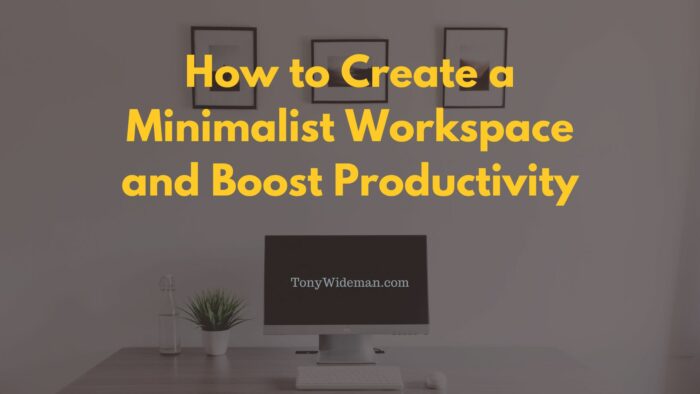
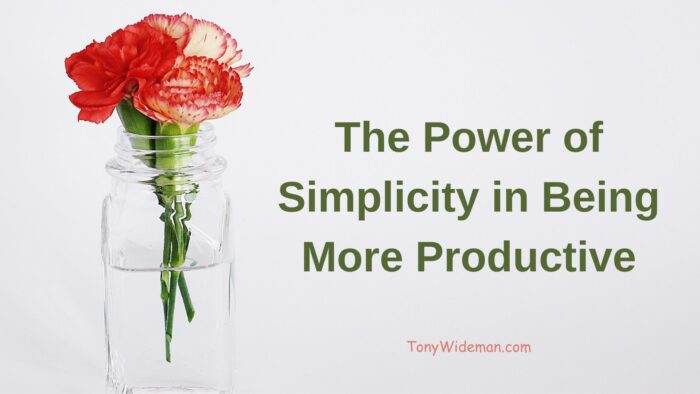
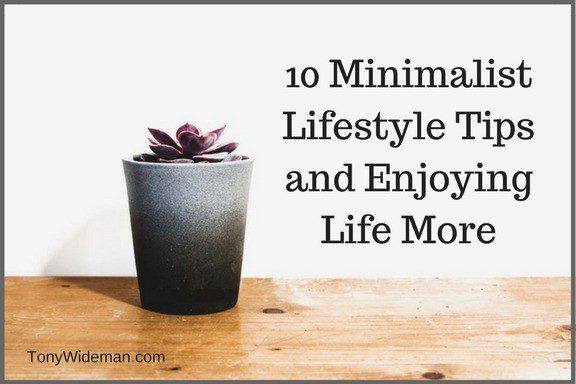


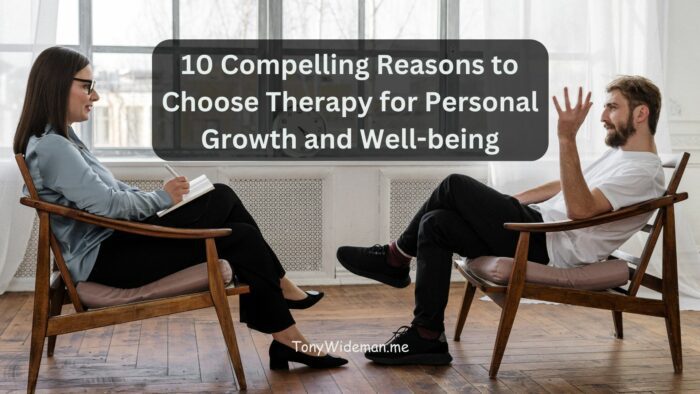
Great post Tony!
There are a lot of items in my house that I never touch anymore. Like my guitars for instance. I played a ton when I was younger but now I pick it up maybe once every few months.
Thanks for the great eye opener.